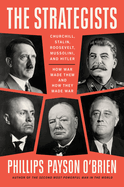
How war and personality shaped the grand strategy of five of the most influential leaders of World War II is the fascinating focus of The Strategists by historian Phillips Payson O'Brien (The Second Most Powerful Man in America). Referring to his subjects--Winston Churchill, Joseph Stalin, Franklin Delano Roosevelt, Benito Mussolini, and Adolf Hitler--as "The Five," O'Brien takes a fresh approach to a well-trodden topic with his emphasis on World War I as a defining shaper of each of the "grand strategists."
Hitler's experiences as a dispatch runner in that war embedded in his mind "the decisive power of modern, heavy artillery," but as a leader, his "stress on strength" was coupled with an inability "to understand rational trade-offs" such as mobility, O'Brien notes. Unsurprisingly, Churchill and Roosevelt receive high marks for their dominance of what O'Brien terms "the air-sea super-battlefield" and their view that the land war would be of "secondary" importance. They were right about this, he contends. Stalin held the "ideological/paranoid view of strategy," and Mussolini believed war was "a contest of will" not reliant on the quality and quantity of military material.
O'Brien seeds the ground in the first half of his study with the development of each leader's mindset, while the second half rigorously dissects the impacts of their decisions upon the course of the war, with a superb interlude bridging the interwar years. The Strategists is a rewarding and robust historical and psychological approach to the grand strategists of World War II and the decisions they--and they alone--made for the world. --Peggy Kurkowski, book reviewer and copywriter in Denver

